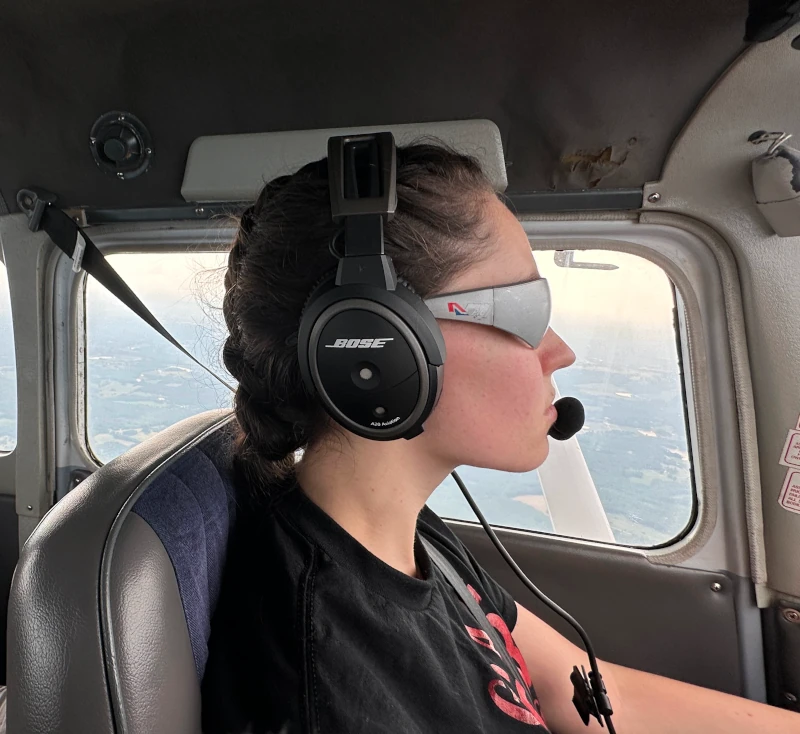How to get your instrument rating
Get your instrument rating in Lanett, Alabama
Become an instrument rated pilot
Instrument Rating
An Instrument Rating is a rating that grants you the privileges
to fly in IFR (Instrument Flight Rules) weather.

Instrument Rating
What is an Instrument Rating?
When you start flying, you learn about different weather conditions and the challenges weather entails including visibility, cloud coverage, and thunderstorms. As a private pilot, you're limited to flying in good weather. Sometimes, weather conditions make flying visually unsafe, and that's where the instrument rating comes in.
Getting an instrument rating is the next step in your training. It allows you to handle more challenging weather with proper training. Essentially, you'll learn to fly by focusing only on your flight instruments, without relying on the ground or horizon. This skill is crucial for flying in less than ideal weather conditions.
During the process, you'll understand the rules, procedures, and the published minimums to fly safely in such conditions. It's about expanding your skills and flying confidently in more complex weather situations.
- Complete Your Private Pilot You must have finished your private pilot in order to start training for your instrument rating.
- Pass Your Instrument Written Exam Study and solidify core instrument rating concepts. Be able to reach approach plates and IFR charts. Understand the US Air Traffic Control System and your role as a pilot in the system.
- Meet Minimum Requirements You'll need to complete 50 hours of cross country time and at least 40 hours under the hood. You'll also need to fly an IFR cross country and complete training with an instructor.
- Fly With an Examiner You'll fly with a FAA Designated Pilot Examiner (DPE) and demonstrate you have the skills to fly IFR and meet the requirements of the Airmen Certification Standards (ACS).
Blue Skies Above will prepare you for all of the required exams with the necessary materials and education. Give us a call and schedule a discovery flight to get started.
What to expect during instrument training?
Prepare for intensive learning during instrument training. The instrument rating is renowned for its information packed curriculum. Dive deep into regulations, procedures, and mastering the skill of reading charts and FAA literature. Learn crucial skills for navigating IFR weather with precision and safety.
To start instrument training at Blue Skies Above, take the initial step by reaching out to Blue Skies Above team today. Connect with our team, explore the classroom and planes, and review the comprehensive syllabus. Let's kickstart your instrument rating. This is your opportunity to become a more skilled and confident pilot!
Frequently Asked
Why Get an Instrument Rating?


Are you a pilot wondering if getting an instrument rating is worth it? If so, you're not alone. Many pilots ask themselves the same question, and it's a decision that requires careful consideration. But before we get into the benefits of an instrument rating, it's important to understand exactly what are the requirements.
Part 61 Instrument Rating Requirements
- Hold at least a private pilot certificate
- Be able to read, speak, write, and understand the English language
- Pass a written exam on the subject of instrument flying
- Accumulate a minimum of 50 hours of cross-country flight time as a pilot
- Accumulate a minimum of 40 hours of instrument flight time, including at least 15 hours of instrument flight training from a certificated flight instructor
- Pass a practical test, also known as a checkride, with a DPE
4 Reasons to Get an Instrument Rating
Improved safety: One of the most compelling reasons to get an instrument rating is the improvement in safety it provides. By learning to fly in instrument meteorological conditions (IMC), you'll be better equipped to handle unexpected weather events and other challenges that may arise during flight. With an instrument rating, you'll be able to fly with greater confidence and proficiency, knowing that you have the skills and knowledge to handle a wider range of situations.
Enhanced career opportunities: An instrument rating can also strengthen your career prospects as a pilot. Many airlines and other aviation employers prefer to hire pilots with instrument ratings, as they demonstrate a higher level of skill and professionalism. Additionally, an instrument rating may be required for certain types of flying, such as flying for an airline or chartering aircraft.
Improved situational awareness: Another benefit of an instrument rating is the improvement in situational awareness it provides. By learning to fly using instruments, you'll develop a heightened sense of awareness and attention to detail that can translate to all aspects of flying. This increased awareness can help you make better decisions and react more quickly to changing conditions, leading to safer, more efficient flights.
Increased enjoyment: Finally, many pilots find that getting an instrument rating enhances their enjoyment of flying. With an instrument rating, you'll have the skills and confidence to fly in a wider range of conditions and environments, allowing you to experience the thrill of flight in a whole new way.

Get Your Instrument Rating
Blue Skies Above Professional Flight Instruction is here to help you achieve your goals. Our structured training programs ensure that you receive top notch instruction. Whether you're aiming to enhance safety, open doors to exciting career opportunities, or simply enjoy the thrill of flying like never before, obtaining an instrument rating is a journey worth embarking on. Contact us today and get started.

We are the flight training experts in Lanett, AL
As the only flight school with a Cessna fleet in the area, we pride ourselves in training safe and highly proficient pilots. Come see what everyone's talking about! Visit Blue Skies Above and begin flight training today.
Next Steps
Visit Blue Skies Above
Professional Flight Instruction
Visit our flight school, start pilot training and join the family, like & follow us on social media. We're excited to partner with you and be a part of your aviation journey. Let's go flying together!